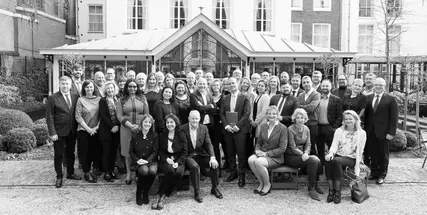Be agile
Digitisation and technological innovation irreversibly change the way business is done. In the digital age, the pace of innovation increases every year, with no signs of it slowing down any time soon. This acceleration impacts businesses in various ways. Many innovations, such as robotization, blockchain, artificial intelligence, machine learning or the internet-of-things are potentially disruptive.
Proven and tested business models can become obsolete in a matter of years or even months. The very idea of a fixed business model has come into question.
Changes in the business environment are no longer sporadic, volatility is ‘the new normal’. As a consequence, decision-making processes need to be fast, short and inclusive. This requires agile leadership, underpinned by a culture of continuous feedback. But be aware that agility is a fraught term. At the heart of any agile innovation, the model is a breakdown of the hierarchy. If you retain an old-school, hierarchical management structure, agile initiatives will eventually fail. For traditional, top-down organisations, transforming into a non-hierarchical organisation may be one of the main challenges in the years ahead.
Lead the disruption
Competition is becoming fiercer and multi-directional. Focus has shifted to Customer-value thinking. It is no longer only the traditional competitors the companies have to worry about. Disintermediation brought consumers directly in touch with manufacturers.
Instead of relying on traditional R&R, businesses should focus on new ideas, continual innovation, redesigning business processes and embedding this in their corporate culture and organisational structure. Don’t wait for disruptive technology to come your way, lead the disruption.
A great example comes from NGO War Child, an organisation that is committed to improving the lives of thousands of children affected by armed conflict. As a relatively small NGO, the impact of War Child is limited. To increase its impact, the NGO recently adopted a disruptive strategy; it now shares its research and methods with other, bigger NGO’s, and encourages them to make use of it. This strategy has proven to be successful. UNICEF implements the educational method of War Child in Sudan.
C-suite roundtable discussion hosted by Kestria in Amsterdam
Appreciate the value of soft skills
In future-proof organisations, an Alpha management style, hierarchy and bureaucracy are giving way to shared leadership styles of open communication and employee engagement. The new mantra is to ‘Connect, Collaborate, Influence and Lead’. Leaders should support an environment that cross-pollinates ideas, people and thinking among different disciplines and industries.
We need leaders that care about their employees and take responsibility for their job satisfaction. There is no other way, because this is what the younger generations of employees demand. To retain talent, companies have to embrace their view of work. Microsoft CEO Satya Nadella is a great example of a leader who understands the importance of soft skills. When he took over in 2014, the tech giant was in dire shape. It was losing its competitive advantage to other, more innovative competitors like Apple and Alphabet. Nadella noted that Microsoft was hampered by its management and organisational culture, which was top-down and authoritarian, and put great demands on the private lives of the (predominantly young) employees. Microsoft at the time was also notorious for the vicious infighting between different divisions and teams within the company.
Nadella introduced a culture that is based on emphatic collaboration. The new corporate culture, in combination with a new focus on cloud-based services, turned out to be extremely successful. Microsoft returned to being a growth stock after stagnating for nearly a decade. Business magazine Fast Company praised the CEO in a recent profile: ‘Nadella is a contemporary CEO able to emphasize the kinds of soft skills that are often derided in the cutthroat world of corporate politics but are, in today’s fast-moving marketplace, increasingly essential to outsize performance.’
Diversity is a necessity
Another leadership lesson we can learn from Nadella is that innovation can come from all directions. When a young employee at Microsoft once asked Nadella why he couldn’t print directly from his phone, the CEO simply replied ‘Make it happen. You’re in charge of the project.’ A perfect example of a CEO who understands that ‘innovation’ is not a department, but a culture. Every organisation needs agents of change.
Look at the boardroom from a team’s perspective. You need diverse qualities and attitudes in a board. It can be hard and even unsettling to go outside of your own demographic, but diversity is not just something that is ‘nice to have’, it is a necessity. It pays to have young people on your board, they are more inclined to question existing habits and values and challenge assumptions. Consulting younger people on specific topics can also work really well. Some companies have very positive experiences with an advisory millennial board.
Software company Oracle Netherlands recently created the ‘Young Oracle Board’, with young professionals up to the age of 35 from different business units of the company. The advisory ‘board’ aims to improve the visibility and opportunities within Oracle for young employees.
Of course, diversity is not just about demographics. Intellectual diversity is just as important. Don’t shy away from it, or you will end up with a group of people who think and look alike.
C-suite roundtable discussion hosted by Kestria in Amsterdam
Be curious
In today’s environment of uncertainties, it is unwise to rely solely on tried and tested management practices. Leaders should be alert to unfolding risks and opportunities and agile in embedding innovation, risk-taking and creativity into the culture and structure of their organisations. New methodologies should be developed for acquiring, sharing and disseminating knowledge and engaging with people within and without the organisation.
Leaders should be curious all the time. Without curiosity, you can’t be a leader of the pack. At the same time, it is often the collective, not an individual leader that makes the difference. In the end, leadership is about spreading the power.
Adapt to your environment, but stay true to your values
The future is inherently uncertain and open to different interpretations. In today’s world, the future is closing in on us. We live in VUCA-times: Volatile, Uncertain, Complex and Ambiguous. A modern leader makes more decisions in one week than a 16th century-leader in a lifetime. Our nervous system never faced these problems before. We have much more information at our disposal, that makes decision making more complex. Leaders have to digest information, prioritise, make sure that they do not get lost in the information flow, and chose the right time for making a decision.
All things considered, a conventional approach to strategic planning can be downright dangerous as they neither defend against the threats nor take advantage of the opportunities that higher levels of uncertainty may bring.
Therefore, companies need a flexible strategy. Adapt to your environment and don’t waste too much time on long-term and detailed strategies. Decide, test, learn, refine: strategy should become a daily exercise. You are working with moving targets. Sometimes, the best strategy can be to have no strategy at all.
Even in a VUCA business environment, companies should stay focused on what they do best and stay true to their roots and their culture. Meaning, values and purpose have to be at the heart of your company. Don’t let uncertainties distract you from what you are good at, or make you forget who you are. In general, evolution is more sustainable than revolution.
Delegates of the C-suite roundtable discussion hosted by Kestria
EXECUTIVE SUMMARY
The main takeaways from the Kestria EMEA Round Table on Leadership Transformation:
- Be agile. Decision-making processes need to be fast, short and inclusive. This requires agile leadership, underpinned by a culture of continuous feedback. Agile leadership can only succeed in a non-hierarchical organisation.
- Lead the disruption. Businesses should focus on new ideas, continual innovation, redesigning business processes and embedding this in their corporate culture and organisational structure. Don’t wait for disruptive technology to come your way, lead the disruption.
- Appreciate the value of soft skills. Leaders should care about their employees and take responsibility for their job satisfaction. So-called ‘soft skills’ may be the key to hard-earned success. This is what younger generations of employees demand.
- Diversity is a necessity. It can be hard and even unsettling to go outside of your own demographic or intellectual peer group, but diversity is not just something that is ‘nice to have’, it is a necessity. If you end up with a group of people who look and think alike, you will miss out on fresh perspectives.
- Be curious. Leaders should be curious all the time. Without curiosity, you will never be a leader of the pack.
- Adapt to your environment, but stay true to your values. In VUCA-times, companies need a flexible strategy. Adapt to your environment and don’t waste too much time on long-term and detailed strategies. Decide, test, learn, refine: strategy should become a daily exercise. But: Don’t let uncertainties distract you from what you are good at, or make you forget who you are.




